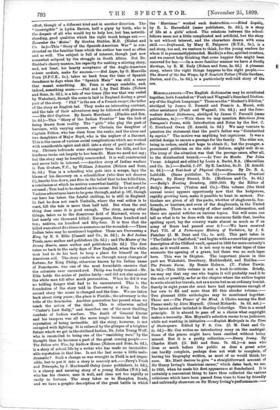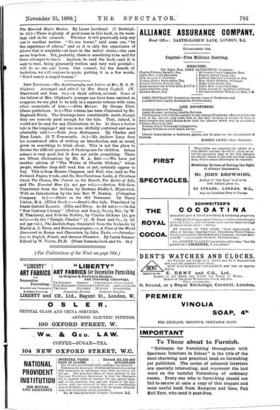MISCELLANIC0178.-Two English dictionaries may be mentioned together, both founded on"
F unk and Wagnall'a Standard Diction- ary of the English Language." These are the" Student's Edition," abridged by James C. Fernald and Francis A. Marsh, with other assistance (Funk and Wagnall, 10s. 6d.) ; and the Inter- mediate School Dictionary, abridged by James C. Fernald (same publishers, 4s.)-With these we may mention Selections from Tennyson's Poems, with Introduction and Notes by the Rev. C. C. Everhard Owen (E. Arnold, is. 6d.) We may venture to question the statement that the poet's father was "disinherited by caprice." The motive was anything but capricious. It was a settled design to secure a peerage for the family. The elder son, being in orders, could not hope to obtain it ; but the younger, a prominent politician on the side of Reform, might well do so. The irony of the situation was that the peerage came, after all, to the disinherited branch.-Le Tour du Monde. Par Jules Verne. Adapted and edited by Louis A. Barbb, BA. (Macmillan and Co. 2s.)-Euclid, I.-IV. By R. Lachlan, Sc.D. (E. Arnold. 4s. 6d.)--21 Text-book of Physical Chemistry. By Dr. R. A. Lehfeldt. (Same publisher. 7s. 6d.) -Elementary Practical Physics. By Henry Stroud, D.Sc. (Methuen and Co. 3s. 6d.) -Baiiy's Hunting Directory, 1899-1900. By the Editor of Bai/y's Magazine. (Vinton and Co.)-This volume (the third annual issue) appears opportunely now that the hedgerows, rapidly growing bare, make it possible to hunt in earnest. Par- ticulars are given of all the packs, whether of stiighounds, fox- hounds, or harriers, and even of the draghounds, in the United Kingdom. There is a variety of other useful information, and there are special articles on various topics. But will some one tell us what is to be done with the enormous fields that, besides spoiling sport, lay the country waste almost as much as if an army of Boers had passed over it ?-We have received Part VII. of A Picturesque History of Yorkshire, by J. S. Fletcher (J. M. Dent and Co., Is. net). This part takes in "The Calder to Castleford," and begins with a somewhat gruesome description of the Clifford vault, opened in 1803 for mere curiosity's sake, as it would seem. It is not easy to say what lapse of time warrants the opening of a grave, but there was no such lapse here. This was in Skipton. The important places in this part are Wakefield, Dewsbury, Huddersfield, and Halifax.- The Private Nurse. By Bessie Holmes. (T. Fisher Unwin. 38. 6d.)-This little volume is not a book to criticise. Briefly, we may say that any one who begins it will probably read it to the end, or possibly, as far as the chapter where the author begins to write about her travels, not as a nurse but as an ordinary tourist. Surely in eight years she must have had experiences enough of her own to fill and more than fill this slender volume.- Two pleasant little anthologies may be mentioned together. These are :-The Plower of the Mind. A Choice among the Best Poems mado by Alice Meynell. (Grant Richards. 3s. 6d. net.)- The latest author included is Hartley Coleridge. This is a sound principle. It is absurd to pass off as a choice what copyright makes a necessity. Mrs. Meynell's selection seems to us judicious, while not wanting in initiative.-English Madrigals in the Time of Shakespeare. Edited by F. A. Cox. (J. M. Dent and Co. 2s. 6d.)-Mr. Cox writes an introductory essay on the madrigal. Some of the pieces might have been omitted without being missed. But it is a pretty collection.-Henry Irrovag. By Charles Hiatt. (G. Bell and Sons. 7s. 6d.)-A man who lives so much before the public as does a great actor. can hardly complain, perhaps does not wish to complain, or having his biography written, as most of us would think, too soon. Mr. Hiatt desires to give "a straightforward account of Sir Henry Irving's theatrical career," which dates back, we see, to 1856, when he made his first appearance at Sunderland. It is certainly a convenient thing to have thus collected the various criticisms which have been passed from time to time by friendly and unfriendly observers on Sir Henry Irving's performances.- The Married Man's Mentor. By Lucas Lovibond. (T. Burleigh. 2s. 6d.)—There is plenty of good sense in this book, in it warn- ings and in its counsels. Whether it will practically help any one is another matter. "No one learns," said some one, "by the experience of others," and as it is only the experience of others that is available—at least in the initial choice—the case seems hopeless. Yet, probably, there is something to be said for these attempts to teach. Anyhow, to read the book—and it is easy to read, being pleasantly written and very well printed— will do no one any harm. One counsel, for the benefit of bachelors, we will venture to quote, putting it in a few words, "Don't marry a stupid woman."











































 Previous page
Previous page